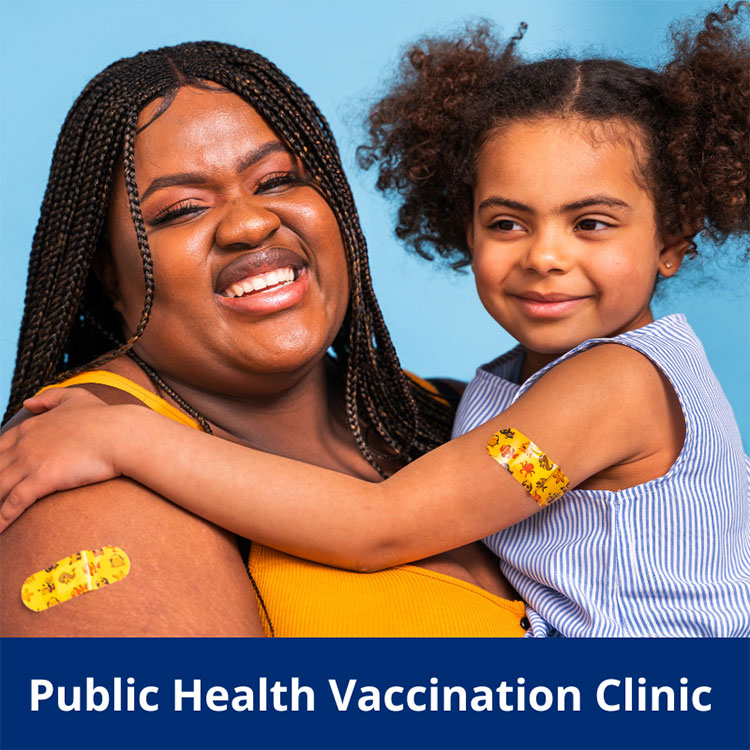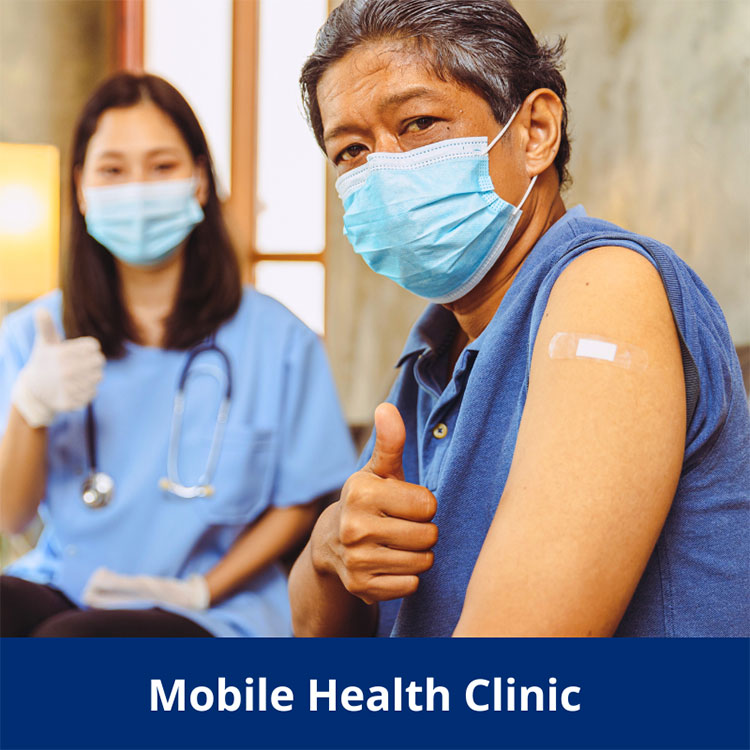Fight Flu and Crush COVID
Keep you and your loved ones protected from flu and COVID this season. From education to the latest vaccine information, we’re here to empower you with tools and tips to stay one step ahead of flu and COVID-19. Let’s put the unity in immunity and build a healthier community together!
Fight Flu
Flu is a contagious respiratory illness caused by influenza viruses that infect the nose, throat, and sometimes the lungs. It can cause mild to severe illness, and at times can lead to death. The best way to prevent flu is by getting a flu vaccine each year.
Flu Symptoms:
Flu can cause mild to severe illness, and at times can lead to death. Flu symptoms usually come on suddenly. People who have flu often feel some or all of these signs and symptoms:
- Fever* or feeling feverish/chills
- Cough
- Sore throat
- Runny or stuffy nose
- Muscle or body aches
- Headaches
- Fatigue (tiredness)
- Some people may have vomiting and diarrhea, though this is more common in children than adults.
*It's important to note that not everyone with flu will have a fever.
Learn more about the fluCrush COVID
COVID-19 most often causes respiratory symptoms that can feel much like a cold, the flu, or pneumonia. Most people with COVID-19 have mild symptoms, but some people become severely ill. Anyone infected with COVID-19 can spread it, even if they do NOT have symptoms.
COVID Symptoms:
The following list does not include all possible symptoms. Symptoms may change with new COVID-19 variants and can vary depending on vaccination status. Possible symptoms include:
- Fever or chills
- Cough
- Shortness of breath or difficulty breathing
- Sore throat
- Congestion or runny nose
- New loss of taste or smell
- Fatigue
- Muscle or body aches
- Headache
- Nausea or vomiting
- Diarrhea
Frequently Asked Questions - Flu
- Who is at risk for getting the flu?
-
Anyone can get flu (including healthy people), and serious problems related to flu can happen at any age, but some people are at higher risk of developing serious flu-related complications if they get sick. This includes people 65 years and older, people of any age with certain chronic medical conditions (such as asthma, diabetes, or heart disease), people with a body mass index (BMI) of 40 kg/m2 or higher, pregnant people, and children younger than five years.
- How does the flu spread?
-
Most experts believe that flu viruses spread mainly by tiny droplets made when people with flu cough, sneeze, or talk. These droplets can land in the mouths or noses of people who are nearby. Less often, a person might get flu by touching a surface or object that has flu virus on it and then touching their own mouth, nose or possibly their eyes.
- When is someone with the flu contagious?
-
People with flu are most contagious during the first three days of their illness. Some otherwise healthy adults may be able to infect others beginning one day before symptoms develop and up to five to seven days after becoming sick. Some people, including young children and people with weakened immune systems, may be contagious for longer periods of time.
- How can I prevent the flu?
-
The first and most important step in preventing flu is to get a flu vaccine each year. Flu vaccine has been shown to reduce flu-related illnesses and the risk of serious flu complications that can result in hospitalization or even death. CDC also recommends everyday preventive actions like staying away from people who are sick, covering coughs and sneezes, and frequent handwashing to help slow the spread of germs that cause respiratory (nose, throat, and lungs) illnesses like flu.
- Will the flu vaccine give me the flu?
-
No, flu vaccines cannot cause flu illness. Flu vaccines given with a needle (i.e., flu shots) are made with either inactivated (killed) viruses or with only a single protein from the flu virus.
- I got the flu vaccine last year. Do I need to get it again?
-
A person’s immune protection from vaccination declines over time, so an annual vaccination is needed to get the “optimal” or best protection against the flu. Additionally, flu viruses are constantly changing.
- Is it better to get immunity from the flu than to get the vaccine?
-
Any flu infection can carry a risk of serious complications, hospitalization or death, even among otherwise healthy children and adults. Therefore, getting vaccinated is a safer choice than risking illness to obtain immune protection.
- How do I know if it’s a cold or the flu?
-
The signs and symptoms of flu can include fever or feeling feverish/chills, cough, sore throat, runny or stuffy nose, muscle or body aches, headaches, and fatigue (tiredness). Cold symptoms are usually milder than the symptoms of flu. People with colds are more likely to have a runny or stuffy nose. Colds generally do not result in serious health problems.
- How do I know if it’s the flu or COVID?
-
Influenza (Flu) and COVID-19 are both contagious respiratory illnesses, but they are caused by different viruses. COVID-19 is caused by infection with a coronavirus named SARS-CoV-2, and flu is caused by infection with one of the influenza viruses. You cannot tell the difference between flu and COVID-19 by symptoms alone because some of the symptoms are the same.
- Where can I get the flu vaccine?
-
Click the links below to view locations that offer vaccinations:
Public Health Vaccination Clinic
Community Health Centers
Mobile Health Clinic
Frequently Asked Questions - COVID
- Who is at risk for getting COVID?
-
Anyone can get COVID (including healthy people), and serious problems related to COVID can happen at any age, but some people are more likely than others to get very sick if they get COVID-19. This includes older people; people who are immunocompromised (have a weakened immune system); people who have certain disabilities, or people who have underlying health conditions.
- How does COVID spread?
-
COVID-19 spreads when an infected person breathes out droplets and very small particles that contain the virus. Other people can breathe in these droplets and particles, or these droplets and particles can land on others' eyes, nose, or mouth. In some circumstances, these droplets may contaminate the surfaces they touch. Anyone infected with COVID-19 can spread it, even if they do NOT have symptoms.
- How can I prevent COVID?
-
The first and most important step in preventing COVID is to get the COVID vaccine each year. The COVID vaccine provides the best protection. CDC also recommends everyday preventive actions like staying away from people who are sick, covering coughs and sneezes, and frequent handwashing to help slow the spread of germs that cause respiratory (nose, throat, and lungs) illnesses like flu.
- Do I need to wait after getting the flu vaccine or other vaccines before getting the COVID vaccine?
-
There is no recommended waiting period between getting a COVID-19 vaccine and other vaccines. You can get a COVID-19 vaccine and other vaccines, including a flu vaccine, at the same visit.
- If I already got COVID and recovered, do I still need to get the vaccine?
-
Yes. You should get a COVID-19 vaccine even if you had COVID-19 infection. Getting a COVID-19 vaccine after you recover provides added protection. Plus, while people can get some protection from having COVID-19, the level and length of that protection varies, especially as COVID-19 variants continue to emerge.
- Should my child get the COVID vaccine?
-
Parents and caregivers should get their child (6 months and older) vaccinated as soon as possible. Getting vaccinated provides the best protection against serious illness if a child gets infected with the virus that causes COVID-19.
- What are the risks of getting the COVID vaccine?
-
Adults and children may have some side effects from a COVID-19 vaccine, including pain, redness or swelling at the injection site, tiredness, headache, muscle pain, chills, fever, and nausea. These side effects typically resolve after a few days. Serious side effects are rare but may occur.
- Does the COVID vaccine alter my DNA?
-
Both messenger RNA (mRNA) and protein subunit COVID-19 vaccines work by delivering instructions (genetic material) to your cells to start building protection against the virus that causes COVID-19. After the body produces an immune response, it gets rid of all the vaccine ingredients just as it would get rid of any information that cells no longer need. This process is a part of normal body functioning.
The genetic material delivered by mRNA vaccines never enters the nucleus of your cells, which is where your DNA is kept, so the vaccine does not alter your DNA. Learn more about how COVID-19 vaccines work.
- Where can I get the COVID vaccine?
-
Click the links below to view locations that offer vaccinations:
Public Health Vaccination Clinic
Community Health Centers
Mobile Health Clinic



